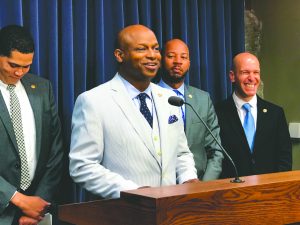Bill would allow Illinois collegiate athletes to be paid for endorsement deals
By Jerry Nowicki Capitol News Illinois — October 4, 2019
Rep. Emanuel “Chris” Welch (D-Hillside0 speaks during a news conference May 29 at the Capitol in Springfield. Welch has proposed legislation that would allow college student athletes to sign endorsement deals, hire agents and benefit financially from the use of their likeness (File photo by Rebecca Anzel/Capitol News Illinois)
SPRINGFIELD — An Illinois lawmaker is sponsoring a bill to allow college student athletes to sign endorsement deals, hire agents and benefit financially from the use of their likeness after California became the first state in the nation to pass such a law earlier this week.
“First and foremost, it’s about fairness and equity, and athletes being able to profit off their own names and their own likeness,” said Democratic Rep. Emanuel “Chris” Welch, of Hillside.
Welch said universities make millions off student athletes each year, and the NCAA — the governing body that oversees college athletics — generates tens of billions of dollars each year. The association’s rules, however, prohibit endorsement deals and prevent student athletes from cashing in on the popularity of collegiate sports which they helped create, he said.
Welch’s measure, House Bill 3904, duplicates the California law and states any association, including the NCAA, “may not prevent a student athlete … from earning compensation as a result of the use of the student’s name, image, or likeness.” The bill also prohibits the NCAA from barring a university from competition if its athletes are compensated in such a manner, and prohibits universities from upholding any rules that ban endorsements. The bill would apply to both public and private universities.
While it allows student athletes to hire agents, it does not pave the way for them to seek salaries or payment, outside of scholarships, from their college or university, Welch said.
“The salary issue is completely separate and apart from an athlete being able to sign an endorsement deal to profit from their own name and their own likeness,” Welch said. “I have no concerns about this threatening the purity of the sport and amateur sports. …This is a very tightly-written bill that I think takes that concern into consideration and eliminates it.”
Welch said the bill does prohibit a student athlete from receiving an endorsement from a direct competitor to a partner organization of their university.
“For instance, if the university has a contract with Under Armour, players can’t sign a deal with Nike,” he said.
The NCAA opposed California’s efforts to pass such a bill.
“As a membership organization, the NCAA agrees changes are needed to continue to support student-athletes, but improvement needs to happen on a national level through the NCAA’s rules-making process,” the association said in a statement. “As more states consider their own specific legislation related to this topic, it is clear that a patchwork of different laws from different states will make unattainable the goal of providing a fair and level playing field for 1,100 campuses and nearly half a million student-athletes nationwide.”
The association said it will “consider next steps in California” while its members “move forward with ongoing efforts to make adjustments to NCAA name, image and likeness rules.”
A statement from the Pac-12 athletic conference, which is home to some of California’s largest and most competitive schools, said the conference “is disappointed in the passage” of the California law.
“This legislation will lead to the professionalization of college sports and many unintended consequences related to this professionalism, imposes a state law that conflicts with national rules, will blur the lines for how California universities recruit student-athletes and compete nationally, and will likely reduce resources and opportunities for student-athletes in Olympic sports and have a negative disparate impact on female student-athletes,” the conference said in the statement.
Like the California bill, Welch’s measure would take effect in 2023. The reason for the grace period is to allow for an expected legal challenge, Welch said.
“I think it’ll be challenged in court because the NCAA has a bottomless pit of money,” he said. “It makes millions off of student athletes every year. And that’s why in the California law and my bill, the effective dates don’t start until 2023. In anticipation, you know, of having this resolved via the court.”
Welch said California’s action on the matter means Illinois must act to stay competitive on a recruiting basis.
“From a recruiting standpoint, we need to be on par with the law in California. That’s an amazing recruiting tool for their coaches and those universities in California,” he said. “And that means time is of the essence.”
Welch said he wants to move the bill, which has gained one Republican and six Democratic co-sponsors since it was filed Sept. 30, when the General Assembly returns for fall veto session on Oct. 28.
A request for comment from the University of Illinois was not immediately returned.
Jnowicki@capitolnewsillinois.com







